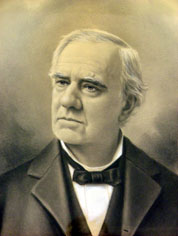Samuel F. Phillips facts for kids
Quick facts for kids
Samuel F. Phillips
|
|
|---|---|
 |
|
| 2nd Solicitor General of the United States | |
| In office December 11, 1872 – May 1, 1885 |
|
| Appointed by | Ulysses Grant |
| Preceded by | Benjamin H. Bristow |
| Succeeded by | John Goode |
| 1st Auditor of Public Accounts of North Carolina |
|
| In office January 1, 1863 – July 10, 1864 |
|
| Succeeded by | Richard H. Battle |
| Personal details | |
| Born |
Samuel Field Phillips
February 18, 1824 New York, New York |
| Died | November 18, 1903 (aged 79) Washington, D.C. |
| Resting place | Chapel Hill, North Carolina |
| Spouses | Frances R. Lucas Sarah Maury |
| Alma mater | University of North Carolina at Chapel Hill |
Samuel Field Phillips (born February 18, 1824 – died November 18, 1903) was an important American lawyer and politician. He worked to protect civil rights, especially for African Americans. Phillips served as the second Solicitor General of the United States from 1872 to 1885. He also played a role in the famous civil rights case, Plessy v. Ferguson.
Contents
Early Life and School Days
Samuel F. Phillips was born in New York. When he was about two years old, his family moved to Chapel Hill, North Carolina. His father, James Phillips, was a British mathematician who became a professor at the University of North Carolina at Chapel Hill (UNC).
Samuel graduated from UNC with top honors in 1841. Three years later, he earned his master's degree. He then started his own law practice in North Carolina. He also taught law at UNC for a short time.
Starting a Political Career
Phillips began his career in politics. He was elected to the North Carolina General Assembly in 1852 and 1854 as a member of the Whig Party. This was a major political party at the time.
Later, Phillips served on North Carolina's state Court of Claims in 1861. He also worked as the state auditor from 1862 to 1864. An auditor checks government money and records.
Working for Peace and Rights
Phillips did not support secession, which was when Southern states left the United States. During the U.S. Civil War, he joined the "Peace Party." This group wanted North Carolina to stop fighting.
In 1864, Phillips was re-elected to the General Assembly. He became the Speaker of the North Carolina House of Representatives in 1866. He was also part of the first "Reconstruction Convention." This convention helped rebuild the South after the war.
Phillips joined the Republican Party. Some people called him a "scalawag," which was a negative term for Southerners who supported Reconstruction. He worked hard to expand legal rights for African-Americans. He helped them gain the right to speak in court cases where they were involved.
National Role as Solicitor General
In 1866, Phillips left politics to practice law again. He moved to Raleigh, North Carolina, and became a reporter for the state's Supreme Court. He returned to politics in 1870.
In 1871, Phillips served another term in the North Carolina House of Representatives. In 1872, President Ulysses S. Grant appointed Phillips as the second U.S. Solicitor General. This job means he was the main lawyer who argued cases for the U.S. government in the Supreme Court.
Phillips served as Solicitor General from November 1872 to May 1885. He worked under four presidents: Grant, Hayes, Garfield, and Arthur. He argued many important cases.
Fighting for Voting Rights
Phillips argued that the 1871 Enforcement Act was constitutional. This law helped protect voting rights. He supported punishing members of the Ku Klux Klan who attacked a Black man for voting. Phillips's arguments helped set a legal example. This example was used later to protect federal control over elections.
The Plessy v. Ferguson Case
Phillips was part of the legal team for the Civil Rights Cases of 1883. He used the Civil Rights Act of 1875 and the 13th and 14th Amendments to defend civil rights.
He also helped represent Homer Plessy in the famous Plessy v. Ferguson case. Phillips argued that "separate-but-equal" facilities were unfair to African Americans. He said this idea was like slavery because it treated people differently based on their skin color.
After being Solicitor General, Phillips returned to private law practice in Washington, D.C. He worked there until 1901.
Personal Life
Phillips married Frances R. Lucas in 1849. They had 10 children together. Frances passed away in 1883. In 1889, Phillips married Sarah Maury, who died in 1902. They did not have any children.
Samuel Phillips died on November 18, 1903, when he was 79 years old, in Washington, D.C.. His body was later moved to Chapel Hill, North Carolina.
His sister was Cornelia Phillips Spencer (1825-1908). She was a well-known educational activist and author in North Carolina.
 | Leon Lynch |
 | Milton P. Webster |
 | Ferdinand Smith |

